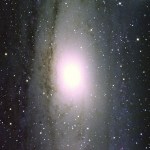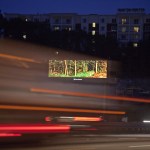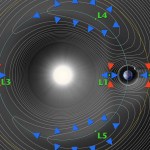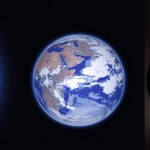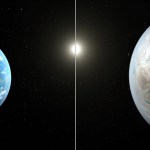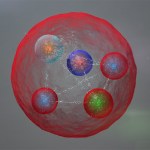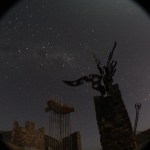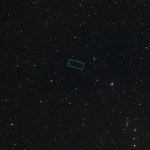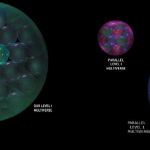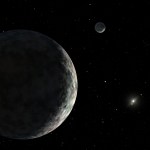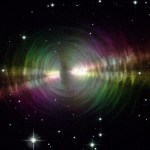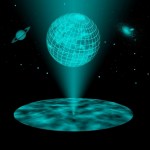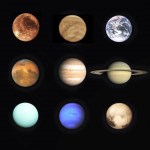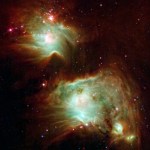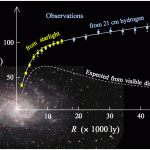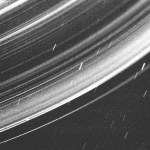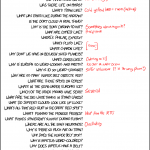
“Our knowledge of stars and interstellar matter must be based primarily on the electromagnetic radiation which reaches us. Nature has thoughtfully provided us with a universe in which radiant energy of almost all wave lengths travels in straight lines over enormous distances with usually rather negligible absorption.” -Lyman Spitzer, Jr.
There's nothing quite like looking at a galaxy, all aglow with the light from billions upon billions of stars shining at once. Some reaches our eyes, some is obscured by light-blocking dust, and all of it comes together to give a spectacular sight.
Image…
“I felt my lungs inflate with the onrush of scenery — air, mountains, trees, people. I thought, ‘This is what it is to be happy.’” -Sylvia Plath
The modern world can often make you feel like you'll never find anything good "playing by its rules" in it. This feeling is evoked, tremendously, in the songs of Bonnie “Prince” Billy, and in particular in this one,
The Southside of the World.
But artist Brian Kane is doing something to bring us back to nature, even in an urban setting.
Image credit: © 2015 Brian Kane, via http://briankane.net/healing-tool/.
Through a form of art known as "…
“It suddenly struck me that that tiny pea, pretty and blue, was the Earth. I put up my thumb and shut one eye, and my thumb blotted out the planet Earth. I didn't feel like a giant. I felt very, very small." -Neil Armstrong
This past week was the 46th anniversary of the first Moon landing for humanity, and yet at Starts With A Bang there was so much going on in the Universe we glossed right over it! Here's what you might have missed:
Can moons have moons? (for Ask Ethan),
The best mining destination (for our Weekend Diversion),
Out of the darkness (for Mostly Mute…
“As the blackness of the night recedes so does the nadir of yesterday. The child I am forgets so quickly.” -Sylvia Ashton-Warner
While the night sky is littered with thousands of points of light -- the stars visible to the naked eye -- we know that beyond what human perception can see, there are hundreds of billions of stars in our galaxy alone, and hundreds of billions of galaxies in the observable Universe. Yet every star that ever has shone or will shine will someday run out of fuel and die.
Image credit: NASA/ESA and The Hubble Heritage Team (AURA/STScI), via https://www.…
“You can spend too much time wondering which of identical twins is the more alike.” -Robert Brault
Earlier today, NASA announced the "most Earth-like exoplanet yet," a planet just 60% larger in radius than our own, orbiting a star of the same spectral class as our Sun and with an almost identical orbital period: 385 days.
Image credit: NASA/JPL-CalTech/R. Hurt.
But is this really the most Earth-like planet we've discovered? It's significantly larger and five times as massive, and may actually be more like Neptune than like Earth. In fact, other properties may be much more important if we…
“It was quite the most incredible event that has ever happened to me in my life. It was almost as incredible as if you fired a 15-inch shell at a piece of tissue paper and it came back and hit you.” -Ernest Rutherford
Over 100 years ago, Ernest Rutherford fired a stream of alpha particles at a thin sheet of gold foil, watching in amazement as some of the particles recoiled, backwards, opposite to the original direction they started off in. With one fell swoop, he had discovered the atomic nucleus.
Image credit: Teach Astronomy / Chris Impey, via http://m.teachastronomy.com/astropedia/…
When you think of the night sky -- of a good, dark night sky -- you probably think of going away, far into the wilderness, away from all human activity. If you're a little more clever, you'll head up, to the top of a high mountain, where the air is thin and steady.
Image credit: Mike Prokosch.
And if you live in a country like Chile, that has the high altitude of the Andes mountains that overlooks the still air of the South American Pacific, that's exactly what you're in for. Luckily, Starts With A Bang writer (and theoretical astrophysics professor) Brian Koberlein recently took a…
“Deep into that darkness peering, long I stood there, wondering, fearing, doubting, dreaming dreams no mortal ever dared to dream before.” -Edgar Allan Poe
Thanks to the Hubble Space Telescope, we've learned for a certainty that the black abyss of empty space isn't really so empty. Far beyond what we can perceive with our naked eye (or even ground-based telescopes), galaxies exist and go on for tens of billions of light years.
Image credit: Digitized Sky Survey (DSS), STScI/AURA, Palomar/Caltech, and UKSTU/AAO, via http://hubblesite.org/newscenter/archive/releases/2010/01/image/h/.
So what…
“Well, this is a thing unheard of. An Elf would go underground, where a Dwarf dare not. Oh, I’d never hear the end of it.” -Gimli, Lord of the Rings
When you think about the different elements present here on Earth, I hope you think about the different ways they bind together, combine, and add value to all we do. Extracting them is a great difficulty, as Uncle Tupelo will sing to you in their song,
Coalminers.
Image credit: Theodore Gray, via http://theodoregray.com/periodictable/Posters/index.posters.html.
For each pure element, there's an abundance in our Solar System that's relatively…
“Just as a Chihuahua is still a dog, these ice dwarfs are still planetary bodies. The misfit becomes the average. The Pluto-like objects are more typical in our solar system than the nearby planets we first knew.” -Alan Stern
The last week here at Starts With A Bang saw some great articles that went from Pluto to stars to nebulae to the theoretical limits of our understanding of everything. When we put it all together, here's what we've covered:
Is the multiverse science? (for Ask Ethan),
The best discoveries from the High Sierra Music Festival (for our Weekend…
“What was scattered, gathers.
What was gathered, blows away.” -Heraclitus
When you're looking around in our Solar System, we've got the Sun at the center, the planets orbiting them, and then moons orbiting the planets in turn.
But why is that necessarily the limit? Couldn't we have "moonlets" or some other, smaller satellites orbiting the moons?
Image credit: Frank Hettick / Fine Art America, via http://fineartamerica.com/featured/jupiter-and-its-moon-lo-as-seen-fran….
It seems like there's no reason that shouldn't be the case, but yet we don't yet know of any in the Solar System. Is there…
“Man loves company — even if it is only that of a small burning candle.” -Georg C. Lichtenberg
The Sun, like all stars initially, burns hydrogen fuel into helium through the process of nuclear fusion. But as the Sun ages, as do all stars over a certain mass, it starts burning those heavier elements in its core, going through different phases of its life cycle and eventually ending in a planetary nebula/white dwarf combination.
Image credit: NASA, W. Sparks (STScI) and R. Sahai (JPL).
But are these transitions sharp or gradual, and what of even more massive stars that start burning carbon,…
When it comes to the fabric of our Universe, we live in four dimensions: three space and one time. At least, that's what it seems like. But it's possible that at very high energy scales -- or at very small distance scales -- not only might even more forces unify, but we might discover that the interactions between particles spill over into even more spatial dimensions.
Image credit: TU Wien.
Is there anything we can use about these higher-dimensional ideas to learn something more about our Universe?
Or, conversely, is there anything we can use from our Universe to learn about the potential…
“Words are the source of misunderstandings.” -Antoine de Saint-Exupéry
Back in 2006, the International Astronomical Union officially defined the word "planet" for the first time, claiming that as long as something met all three of the following criteria:
It was in hydrostatic equilibrium (pulled itself into a spherical/spheroidal shape under its own gravity),
It didn't orbit any other body larger than itself (i.e., wasn't a moon), and
Cleared its orbital path of all other major bodies,
then it got to be a planet.
Image credit: © 2015 The Johns Hopkins University Applied Physics…
“Life is a mirror and will reflect back to the thinker what he thinks into it.” -Ernest Holmes
When you've got a gas cloud in space that emits light, it's only for one of two reasons:
Either it's at high enough temperatures that its atoms are excited and it's emitting its own light as the electrons fall in energy and recombine with nuclei,
Or it's cool and neutral, and is reflecting light off of the brightest stars in its vicinity.
That latter case has a dead giveaway: it always shines blue.
Image credit: ESO/Igor Chekalin, via http://www.eso.org/public/images/eso1105a/.
But…
“Life is a festival only to the wise.” -Ralph Waldo Emerson
Last weekend, I was actually away from the blog for a few days, something that hasn't happened except for one brief trip in March. Only this time, it was 100% for fun, as I was away at the 25 annual High Sierra Music Festival.
Image credit: Pulse Radio, via http://pulseradio.net/articles/2015/04/10-music-festivals-that-won-t-br….
For some, festivals are about the people, the atmosphere, or seeing your favorite bands. But for me? The best part was the discovery of new acts that I had never heard before. I'm so pleased, the…
“If somebody's going to pay money to come see you perform, then it should be something to see.” -Michael Trent
The past two weeks at Starts With A Bang have been awesome for all we've covered, even with a (brief) vacation on my part thrown in there. (Don't worry, you'll get the best of it this weekend!) Here's what we've looked at, in case you've missed anything:
Could dark matter not exist? (for Ask Ethan),
Epic stop-motion karate duel (for our Weekend Diversion),
Underneath your clouds (for Mostly Mute Monday),
How does gravity escape from a black hole? (…
“It’s hard to build models of inflation that don’t lead to a multiverse. It’s not impossible, so I think there’s still certainly research that needs to be done. But most models of inflation do lead to a multiverse, and evidence for inflation will be pushing us in the direction of taking [the idea of a] multiverse seriously.” -Alan Guth
You've heard the question asked before about controversial or new-style pieces of work, "But is it art?" Well, what about the scientific counterpart of that?
Image credit: Moonrunner Design, via http://news.nationalgeographic.com/news/2014/03/140318-multiverse…
“Don’t go around saying the world owes you a living. The world owes you nothing. It was here first.” –Mark Twain
You probably think you know the eight planets pretty well, don't you? Mercury, Venus, Earth, Mars, Jupiter, Saturn, Uranus and Neptune, in order, with the four rocky inner worlds circumscribed by the four gas giants. But can you identify which is which?
Image credit: NASA / Lunar and Planetary Laboratory.
It isn't so easy if you're just shown a picture of a portion of a world, though, or a few candidate images that look somewhat similar, but only one is of the world you…
“Put two ships in the open sea, without wind or tide, and, at last, they will come together. Throw two planets into space, and they will fall one on the other. Place two enemies in the midst of a crowd, and they will inevitably meet; it is a fatality, a question of time; that is all.” -Jules Verne
There are plenty of questions one can ask about our local neck-of-the-woods here. As it stands, the more we learn and discover, the more we realize there is to learn and be discovered. On Monday, xkcd asked some of the most compelling and puzzling questions there are to ask about our very own Solar…
